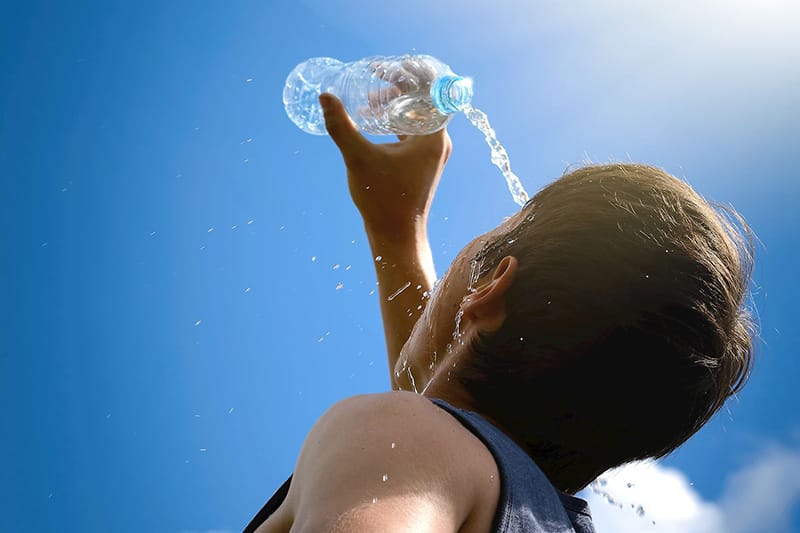Extreme heat is dangerous. Deadly, even. Stay cool on those sunny days with proper precautions.
Posted
by Featured Provider Danney Drewry on Friday, May 25, 2018
 The summer is heating up. And as the temperature outside soars, your body temp can go with it.
The summer is heating up. And as the temperature outside soars, your body temp can go with it.
It’s not just some extra sweat you have to worry about. Heat-related illnesses are serious and even deadly. A nice, relaxing afternoon in the sun can quickly take a turn for the worse.
Heat-related illness — is that like overheating?
That’s exactly what it is. You’ve heard of hypothermia. Well, hyperthermia is when your body overheats from being out in the extreme heat. You have trouble cooling down, so you’re body temperature spikes above 100.4°F — just like when you run a fever fighting an illness.
The humidity of an Iowa summer makes things worse. Sweating is your body’s way of cooling itself. When it’s hot and humid, your sweat doesn’t evaporate off your skin and your body can’t release the heat fast enough.
Overheating can make preexisting conditions, like heart disease or respiratory disease, even worse. If your body temperature doesn’t come down quickly — or worse, keeps rising — you risk developing heat exhaustion or heat stroke.
Heat Exhaustion
Initially, you may have fatigue, cramping, lightheadedness, nausea and flush skin. Once your hyperthermia elevates, it becomes heat exhaustion. Strangely enough, you may still have cool, moist skin. Your body is actively trying to cool itself, but it needs help. If no help arrives, more serious symptoms begin to set in, like:
- Headache
- Dizziness or fainting
- Vomiting
- Fast but weak pulse
- Rapid, shallow breathing
Without quick action, heat exhaustion can lead to heat stroke, a life-threatening condition.
Heat Stroke
Heat stroke is the most serious stage of overheating. Your temperature has reached 103°F and your body has lost its ability to cool down with sweat. Other signs of heat exhaustion include:
- Throbbing headache
- Loss of consciousness
- Diarrhea
- Rapid but strong pulse
- Fast, deep breathing
- Confusion
- Blurred vision
In severe cases of heat stroke, you can have a seizure, fall into a coma, suffer organ failure or, worst case scenario, die.
Not cool. How can I prevent heat exhaustion and heat stroke?
The obvious: stay out of the heat.
That’s not always possible, and not always enjoyable. If you do have to or want to be out in the heat, do so safely. Whether you’re exercising, working or just sitting around, make sure you take extra steps to stay cool. And that means more than sporting those designer shades.
- Go out in the early morning. Plan your outdoor workout, yardwork or entertainment for the a.m. Wrap everything up by midday, before it gets really hot.
- Stay hydrated. Replace all the fluids you’re losing to sweat. Drink plenty of water or sports drinks. The Occupational Health and Safety Administration recommends water breaks every 15 to 20 minutes and drinking four cups of water every hour you’re outdoors when the heat index hits 103°F.
- Avoid alcohol and caffeine. Alcoholic beverages especially are often consumed on beautiful summer days. But both alcohol and caffeine dehydrate you, robbing you of the fluids necessary to cool off. Stick to the hydrating liquids listed above.
- Dress for the weather. You want protection from the sun, but you also want to protect from the heat. Wear light, breathable, loose-fitting clothing. Avoid layers — they’ll just trap heat and keep it close to your body.
- Get out of the car. A hot car is your worst enemy in extreme heat. It traps heat inside the vehicle and increases the risk of heat-related illness. It’s especially dangerous for small children. Never leave a child unattended in a hot car for any period of time.
When you’ve taken all these precautions and you still feel like you’re overheating, cool yourself down as quickly as possible. Go inside where there’s air conditioning or sit in front of a fan. Spray yourself down with a hose, take a cold shower or hold a cool washcloth to the back of your neck. Rehydrate while your symptoms fade, which can take several hours, depending on the severity of your heat-related illness.
If you suspect heat stroke in yourself or someone else, call 911. If it’s you, don’t try to make it to the emergency room yourself. The symptoms of heat stroke are too serious and too dangerous to drive. Seeking medical treatment right away will save you from the most serious consequences of heat stroke.